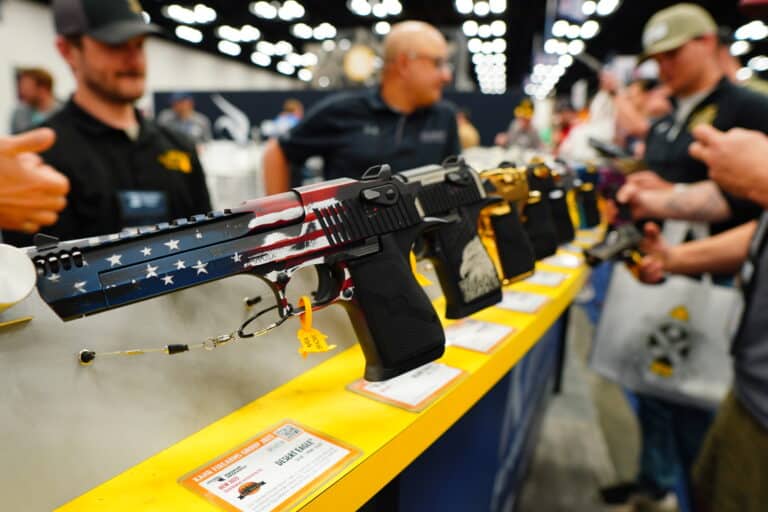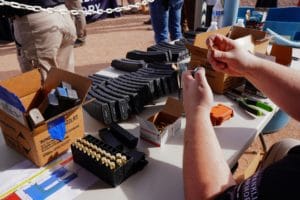Some gun owners don’t want researchers to know they own guns.
Those are the findings of a study published in Social Psychiatry and Psychiatric Epidemiology by the New Jersey Gun Violence Research Center at Rutgers University this month. It found estimates of how many Americans own guns could be off by as much as 45 percent. It also identified several demographics of people who may be most uncomfortable sharing information about their firearms with researchers.
“Bottom line of the study is that some gun owners aren’t comfortable disclosing firearm ownership in surveys. So, from a research perspective, we may not be fully capturing who owns firearms in the US,” Allison Bond, lead author of the study and a doctoral student at the center, told The Reload. “That’s limiting our understanding of firearm ownership and also our ability to reach these individuals and provide them information on things like secure firearm storage methods.”
The results indicate that public survey estimates of American gun ownership, which tend to show about a third of adults self-identify as owners, are significant undercounts. That guns are even more prevalent than previously understood could impact public perception of which regulations on ownership are potentially effective and practical to implement. The study may also cause problems from previous research into the relationship between the prevalence of firearms and different societal issues, such as self-defense, suicide, or violent crime. It could even alter the way researchers approach examining gun ownership altogether.
“This is one of the studies that should hit researchers,” Bond said. “Maybe we need to start adjusting the way we’re asking questions. We can’t always put it on participants to be 100 percent honest all the time if we haven’t created environments in which they feel comfortable doing that if we haven’t interacted with communities in a way that makes us trustworthy. My hope for this piece is that it nudges researchers to start thinking about how they can engage with folks on firearms to help advance research and also to give back to the community that we’re studying,”
Bond, alongside Rutger’s Michael D. Anestis and the University of Southern Mississippi’s Aleksandr T. Karnick and Daniel W. Capron, looked at a survey of 3,500 Americans conducted during the first half of 2020. They created a model to try and predict gun ownership based on several demographic and psychological factors.
“We were just looking at things that previous research has told us differentiates firearm owners from folks who don’t own firearms,” Bond said. “One of those things is threat sensitivity. Another one is intolerance of uncertainty. As humans, most of us don’t like tolerating uncertainty. It’s really not in our nature; we like to know exactly what’s going on. And, yet, we do see some differences between those who own firearms and those who don’t own firearms on that. And then we also included masculinity in the model. There’s a whole measure we used for it that just looks at different traits that are more associated with masculine culture because masculine culture tends to be more associated with firearm ownership as well.”
Then they ran that model against the survey results to see how many respondents who indicated they don’t own guns might fit the profile. The results were surprising. 34 percent of respondents were willing to say they personally own guns–in line with what major pollsters like Gallup and Pew have found.
However, of the people surveyed who said they didn’t own guns but had 50 percent of the indicators for gun ownership in the researcher’s model, 1,036 of the 2,279 fit the profile of a gun owner. In other words, there is reason to think 45 percent of people who told the researchers they didn’t own a gun actually do. If so, that would mean 64 percent of all respondents own a firearm.
“It was definitely one of those situations where we consulted with a statistician a few times just asking are we running this right? Is this the right interpretation? Because these numbers feel high,” Bond said. “But it’s just kind of the nature of the beast with that sort of model.”
So, the team moved the threshold up from 50 percent of the indicators to 75 percent. The results remained significant, with over 10 percent of those saying they don’t own a gun fitting the profile. If those likely owners were counted as owners, it would boost the poll’s overall gun ownership rate from 34 percent to nearly 41.
Further, many demographic groups the researchers identified as reluctant to self-identity as gun owners remained the same as the threshold for IDing potential shy owners was raised.
“Some of it’s just the model picking up people who look like firearm owners but don’t actually own firearms,” Bond said. “Those groups of individuals are probably a better representation of the types of folks who aren’t telling us that they own firearms. Within that, there’s probably a certain percentage that truly doesn’t own firearms.”
The researchers identified three major groups among those they believe aren’t sharing their gun ownership. The first and largest group was unmarried women who are neither white nor black and live in cities. The second group was married white men and women primarily located in urban areas. The third group was married white women who were evenly spread across rural, suburban, and urban areas. The three groups had one thing in common: they didn’t have children living at home with them.
“Gun owners are not a homogeneous group,” Bond said. “We can’t take a one-size-fits-all approach when it comes to any kind of recommendations for firearm owners because people own guns for fundamentally different reasons. Someone in a rural area might own guns because they hunt every weekend. Whereas, in our study, we were seeing more young, unmarried, ethnic, and racial minority women living in urban environments, and they’re probably not hunting, right? They might own a gun for a sense of protection. So, yes, it is trickier to kind of predict those things. And as the landscape continues to shift, I think it is becoming highly important as researchers to not use a one-size-fits-all approach. And don’t assume we know exactly who owns firearms and why they own them.”
Still, Bond cautioned that the study has many limitations.
“We couldn’t identify exactly who is not so comfortable disclosing or why they’re not disclosing,” she said. “It just starts to kind of point us in this direction of we might not be fully capturing firearms ownership in the US properly with how we’re doing it right now.”
But the researchers did offer up some guesses as to why these groups might be unwilling to tell researchers they own guns. They said the urbanites might be concerned about how their neighbors would react to their gun ownership.
“[U]rban environments tend to lean more liberal politically; it may be that these individuals feel that their status as firearm owners differentiates them from and is less accepted by their immediate community, perhaps motivating them to be less forthcoming about their firearm ownership status,” the wrote in the study.
Bond and her co-authors also noted it’s possible many of the minority women identified as potential gun owners in the survey were part of the recent wave of new owners that began to rise in 2020 and may be more distrustful of anyone asking about their firearms.
“It is possible that the individuals comprising Group 1 represent new firearm owners reticent to report their shift in status, having made a purchase they otherwise would not have prior to mid-2020, when this survey was fielded,” the researchers wrote. “Alternatively, individuals in Group 1 may have been more suspicious of the intentions of the survey, opting to withhold their status as firearm owners to avoid sensitive information being obtained by bad actors.”
The researchers noted that some gun owners may distrust researchers they view as hostile to them or their political interests.
“It may be that a percentage of firearm owners are concerned that their information will be leaked and the government will take their firearms or that researchers who are from universities that are typically seen as liberal and anti-firearm access will paint firearm owners in a bad light,” they wrote.
They also suggested some of the people reluctant to say they have guns simply aren’t allowed to own them and don’t want to admit they are breaking the law. Whatever the reasons may be, the researchers concluded the phenomenon of gun owners refusing to self-identify when asked by pollsters or researchers is real and substantial.
“There are several reasons some firearm owners might feel uncomfortable disclosing that they own firearms,” Michael Anestis, executive director of the Rutgers center and senior author of the study, said in a statement. “These results serve as an important reminder that we should not assume we know everything about who owns firearms and that we should ensure that our efforts to reach firearm owners can resonate with broad audiences we might not realize would benefit from the message.”






